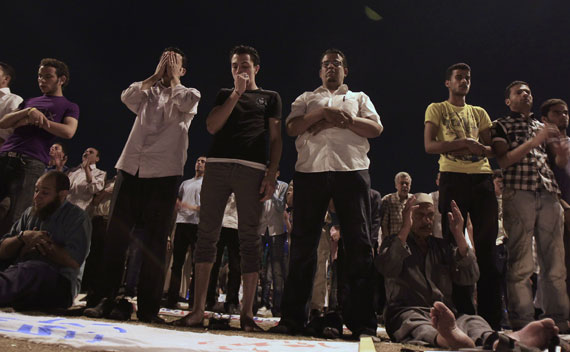Three Things I Learned in Cairo Today
More on:

Another busy day in Egypt. JT and I managed to convince an Egyptian to meet us for breakfast at 8:15 —an achievement—and we just finished our last meeting at 1:00am. We learned a lot, but here are some of the more interesting things I learned today:
- All things considered, the macro-economic indicators do not look that terrible given all the concern about the potential for Egypt’s economic collapse. Growth at the end of the fiscal year will be about 2.6 percent. That’s below where Egypt needs to be in order to provide jobs for new entrants to the labor market, but it is better than expected. Even though my flight was about half full, hotel occupancy rates have crept up to about 50 percent. That’s very good news given the tourism multiplier effect. Suez Canal tolls are stable even if foreign direct investment is off. Overall, Egypt’s economy remains intact and officials are hoping that by this time next year, the post-uprising economic recovery will be well underway.
- No political group or faction has the upper hand. As one astute Egyptian political observer put it, “There is a balance of forces emerging in the political arena.” To be sure, the left, liberal, and revolutionaries are having a hard time organizing, but for all the vaunted organization and resources of the Muslim Brotherhood, the Guidance Bureau is sure having a hard time keeping everyone in check with Abdel Monem Aboul Fotouh’s expulsion and the emergence of the Egypt’s Current Party, made up of Brotherhood Youth.
- Analysts had long pointed to the fissures within the Brotherhood, but in many ways it was the experience of Tahrir that was transformative and contributed mightily to the current fracturing of the movement. One Brotherhood activist explained to me that after a few days in Tahrir, especially after the Day of Rage on January 28, solidarity with his fellow demonstrators from all walks and political tendencies was suddenly far more important to him than whatever orders the Guidance Bureau was handing down, which were disconnected from what he and his colleagues were experiencing. Once Mubarak fell, he found he had no patience for the insular politics of the Brotherhood and felt compelled to devote his energy to working across party lines to build a new more decent political system.
I know this is anecdotal—a little too close to taxi driver research for my comfort—but this guy’s story seemed important if only because he was a committed MB activist from the time he was in his mid-teens and freely admitted that he “owed much to the organization.” Once more, the emergence of the Egypt’s Current seems to be a function of similar sentiments, if not precisely the same experience. I am told that the young MBs who have established this party believe that they did not participate in a revolution to bring down a dictatorship only to submit to the authoritarian nature of the Brotherhood’s leadership. They too want to explore coalitions and partnership with folks across Egypt’s broadening political spectrum.
That’s all for now…
More on:
 Online Store
Online Store
